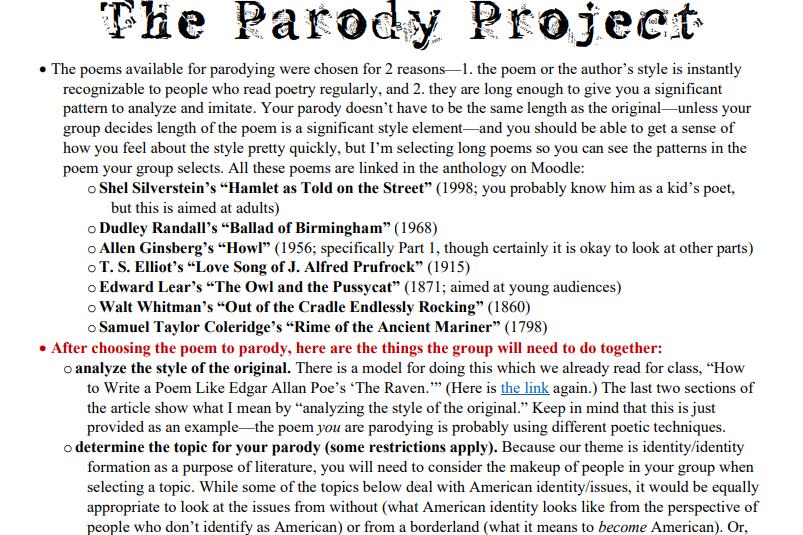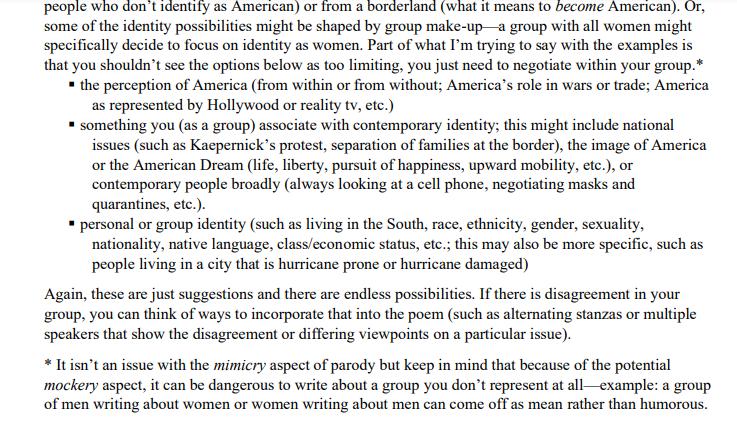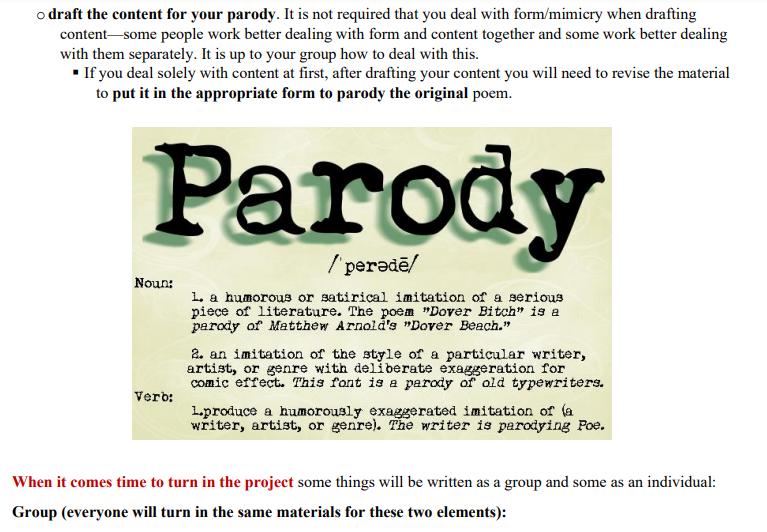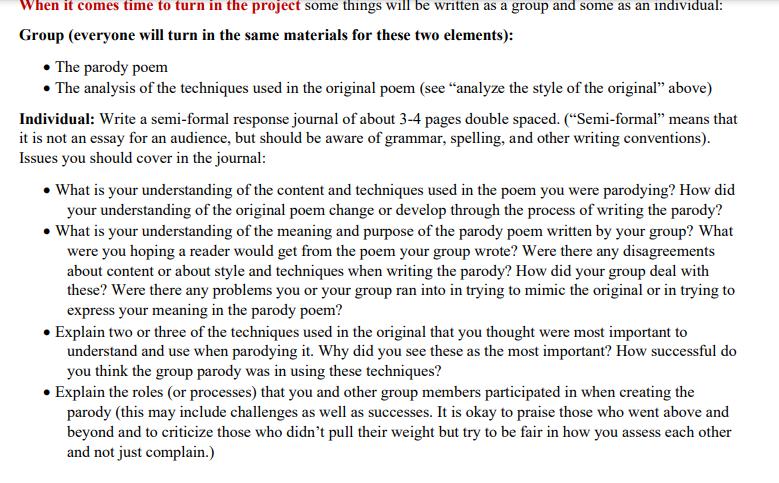Answered step by step
Verified Expert Solution
Question
1 Approved Answer
The Parody Project The poems available for parodying were chosen for 2 reasons-1. the poem or the author's style is instantly recognizable to people




The Parody Project The poems available for parodying were chosen for 2 reasons-1. the poem or the author's style is instantly recognizable to people who read poetry regularly, and 2. they are long enough to give you a significant pattern to analyze and imitate. Your parody doesn't have to be the same length as the original-unless your group decides length of the poem is a significant style element and you should be able to get a sense of how you feel about the style pretty quickly, but I'm selecting long poems so you can see the patterns in the poem your group selects. All these poems are linked in the anthology on Moodle: o Shel Silverstein's "Hamlet as Told on the Street" (1998; you probably know him as a kid's poet, but this is aimed at adults) o Dudley Randall's "Ballad of Birmingham" (1968) Allen Ginsberg's "Howl" (1956; specifically Part 1, though certainly it is okay to look at other parts) o T. S. Elliot's "Love Song of J. Alfred Prufrock" (1915) o Edward Lear's "The Owl and the Pussycat" (1871; aimed at young audiences) o Walt Whitman's "Out of the Cradle Endlessly Rocking" (1860) o Samuel Taylor Coleridge's "Rime of the Ancient Mariner" (1798) After choosing the poem to parody, here are the things the group will need to do together: o analyze the style of the original. There is a model for doing this which we already read for class, "How to Write a Poem Like Edgar Allan Poe's 'The Raven."" (Here is the link again.) The last two sections of the article show what I mean by "analyzing the style of the original." Keep in mind that this is just provided as an example the poem you are parodying is probably using different poetic techniques. o determine the topic for your parody (some restrictions apply). Because our theme is identity/identity formation as a purpose of literature, you will need to consider the makeup of people in your group when selecting a topic. While some of the topics below deal with American identity/issues, it would be equally appropriate to look at the issues from without (what American identity looks like from the perspective of people who don't identify as American) or from a borderland (what it means to become American). Or, people who don't identify as American) or from a borderland (what it means to become American). Or, some of the identity possibilities might be shaped by group make-up a group with all women might specifically decide to focus on identity as women. Part of what I'm trying to say with the examples is that you shouldn't see the options below as too limiting, you just need to negotiate within your group.* the perception of America (from within or from without; America's role in wars or trade; America as represented by Hollywood or reality tv, etc.) something you (as a group) associate with contemporary identity; this might include national issues (such as Kaepernick's protest, separation of families at the border), the image of America or the American Dream (life, liberty, pursuit of happiness, upward mobility, etc.), or contemporary people broadly (always looking at a cell phone, negotiating masks and quarantines, etc.). personal or group identity (such as living in the South, race, ethnicity, gender, sexuality, nationality, native language, class/economic status, etc.; this may also be more specific, such as people living in a city that is hurricane prone or hurricane damaged) Again, these are just suggestions and there are endless possibilities. If there is disagreement in your group, you can think of ways to incorporate that into the poem (such as alternating stanzas or multiple speakers that show the disagreement or differing viewpoints on a particular issue). * It isn't an issue with the mimicry aspect of parody but keep in mind that because of the potential mockery aspect, it can be dangerous to write about a group you don't represent at all example: a group of men writing about women or women writing about men can come off as mean rather than humorous. o draft the content for your parody. It is not required that you deal with form/mimicry when drafting content-some people work better dealing with form and content together and some work better dealing with them separately. It is up to your group how to deal with this. If you deal solely with content at first, after drafting your content you will need to revise the material to put it in the appropriate form to parody the original poem. Parody /perd/ Noun: Verb: L. a humorous or satirical imitation of a serious piece of literature. The poem "Dover Bitch" is a parody of Matthew Arnold's "Dover Beach." 2. an imitation of the style of a particular writer, artist, or genre with deliberate exaggeration for comic effect. This font is a parody of old typewriters. L.produce a humorously exaggerated imitation of (a writer, artist, or genre). The writer is parodying Poe. When it comes time to turn in the project some things will be written as a group and some as an individual: Group (everyone will turn in the same materials for these two elements): When it comes time to turn in the project some things will be written as a group and some as an individual: Group (everyone will turn in the same materials for these two elements): The parody poem The analysis of the techniques used in the original poem (see "analyze the style of the original" above) Individual: Write a semi-formal response journal of about 3-4 pages double spaced. ("Semi-formal" means that it is not an essay for an audience, but should be aware of grammar, spelling, and other writing conventions). Issues you should cover in the journal: What is your understanding of the content and techniques used in the poem you were parodying? How did your understanding of the original poem change or develop through the process of writing the parody? What is your understanding of the meaning and purpose of the parody poem written by your group? What were you hoping a reader would get from the poem your group wrote? Were there any disagreements about content or about style and techniques when writing the parody? How did your group deal with these? Were there any problems you or your group ran into in trying to mimic the original or in trying to express your meaning in the parody poem? Explain two or three of the techniques used in the original that you thought were most important to understand and use when parodying it. Why did you see these as the most important? How successful do you think the group parody was in using these techniques? Explain the roles (or processes) that you and other group members participated in when creating the parody (this may include challenges as well as successes. It is okay to praise those who went above and beyond and to criticize those who didn't pull their weight but try to be fair in how you assess each other and not just complain.)
Step by Step Solution
★★★★★
3.42 Rating (149 Votes )
There are 3 Steps involved in it
Step: 1
The Parody Project The poems available for parodying were chosen for 2 reasons1 the poem or the authors style is instantly recognizable to people who ...
Get Instant Access to Expert-Tailored Solutions
See step-by-step solutions with expert insights and AI powered tools for academic success
Step: 2

Step: 3

Ace Your Homework with AI
Get the answers you need in no time with our AI-driven, step-by-step assistance
Get Started


